Make peace not war
author
Friedrich Schorlemmer
The theologian Friedrich Schorlemmer was a member of the East German civil rights movement and an initiator of the event 'Swords to Ploughshares'. The event became a symbol for the pro-democracy movement. After completing his theology studies, Schorlemmer was a student pastor in Merseburg before becoming a preacher at the All Saint's Church in Lutherstadt Wittenberg. In the 70s, Schorlemmer was a prominent member of the peace, human rights and environmental movement. At the 1983 German Evangelical Church Congress, he was responsible for the "Swords to Ploughshares" event – an extremely touchy event, for the saying itself had already been declared illegal. He gained renown for the creative and innovative use of media – for example, the use of homemade political postcards.
Postcard
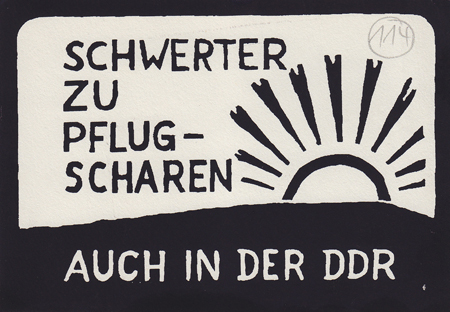
- "Swords to Ploughshares" Event
- "Then they will hammer their swords into ploughshares And their spears into pruning hooks; Nation will not lift up sword against nation, And never again will they train for war." the Bible says, Book of Micah 4,3. Since 1980 demobilization movements in the GDR as well as the west german peace movement took the line "Sword to Ploughshares" as their slogan to plead for demobilization and so to achieve universal peace.
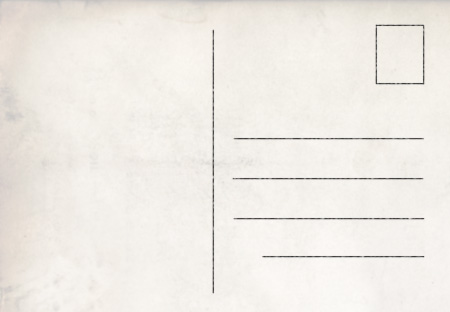
- Blank Backside
- These postcards contain no written texts because they come from Friedrich Schorlemmer's private collection and were never sent. The pastor, together with other like-minded people, produced these and other postcards containing critical content in the 1980s so as to point out social injustices in the GDR. The cards drew attention to, for example, environmental destruction and militarization.
- Distribution
- The postcards were sent, as normal, through the national postal system, whereby due to censorship not all of them reached the addressee. They were also distributed at events and decorated the personal notebooks of students and workers, who on occasion had to remove them because "religious propaganda" was forbidden. For the most part, they were circulated privately – for example, simply given away, on occasion even to soldiers of the National People's Army that happened to pass by.
- Production
- The postcards were usually linocuts printed using a clothes wringer, but they were also made using carved leather stamps or even rolling-pins. Among the images used were photographs taken at demonstrations. The group production of the postcards usually took place at church events such as, for example, peace conferences or weddings. The added text "for official use within the church" offered some limited legal protection.
- Peace Tank
- The self-designed postcards, easily produced in large numbers, were a simple medium to playfully and humorously convey ideas such as environmental awareness, peace and democratization. Popular motifs included caricatures, collages, photographs and/or photomontages. The abstract, collage-like postcard with a caricature by Paul Pribbernow, for example, illustrated the congruencies of propaganda, the defense industry and environmental destruction.
personal archives
"Our future has already begun."
The photograph shows people taking part in a demonstration against the lignite power plant of Espenhain, close to Mölbis. At the time, Mölbis was known as the "dirtiest village of Europe".
country: German Democratic Republic / year:
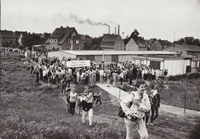
The photograph shows people taking part in a demonstration against the lignite power plant of Espenhain, close to Mölbis. At the time, Mölbis was known as the "dirtiest village of Europe". Friedrich Schorlemmer was active in the East German environmental movement of the 1980s that developed within the church environment and was based on the guiding Christian principle of preserving creation.
"Swords to Ploughshares" Event
During the Evangelical Church Congress in Wittenberg, an event of symbolic character was held on 24 September 1983.
country: German Democratic Republic / year:
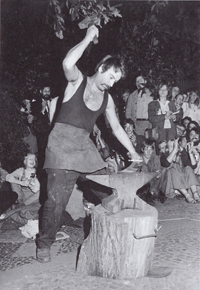
During the Evangelical Church Congress in Wittenberg, an event of symbolic character was held on 24 September 1983. The blacksmith Stefan Nau forged a sword into a ploughshare. The "performance" was in reference to a Biblical quotation, and was an expression of the desire to achieve world peace through global disarmament. In addition to the 4,000 participants, numerous representatives of the Western media as well as Richard von Weizäcker were present, which is why the state authorities did not terminate the event. The performance became a symbol of the peace movement which, in addition to disarmament, also campaigned for a consistent policy of détente between the East and West. Shortly after the event, Stefan Nau had to leave the GDR.
Church Congress in Wittenberg
During the Church Congress in Wittenberg in September, 1983, teenagers break the law and climb on a monument.
country: German Democratic Republic / year:
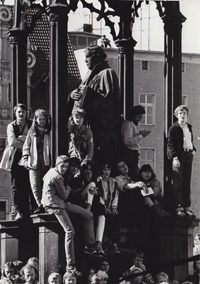
During the Church Congress in Wittenberg in September, 1983, teenagers break the law and climb on a monument. They are listening to the speech given by the then-reigning Mayor of West Berlin, Richard von Weizäcker. The previous day, his presence at the "Swords to Ploughshares" event had helped ensure that the national authorities didn't intervene. The politician was a board member of the 1983 German Evangelical Church Conference.
Environmental Congress in Rötha
Friedrich Schorlemmer holding a sermon at a church service for the environment, held in the vicinity of the Espenhain lignite power plant, close to Mölbis.
country: German Democratic Republic / year:
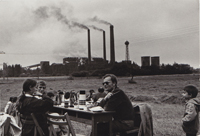
Friedrich Schorlemmer holding a sermon at a church service for the environment, held in the vicinity of the Espenhain lignite power plant, close to Mölbis. At the time, Mölbis had been designated the "dirtiest village of Europe" several times. Friedrich Schorlemmer was active in the East German environmental movement that developed within the church environment in the 1980s, based on the guiding Christian principle of preserving creation.
Industrial Cesspool
In addition to homemade motifs and collages, photographs were also used for the postcards.
country: German Democratic Republic / year:
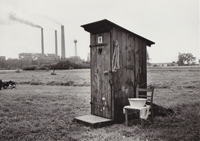
In addition to homemade motifs and collages, photographs were also used for the postcards. This photograph shows a wooden outhouse in the middle of a field in front of the Espenhain lignite power plant, close to Mölbis.
Peace Conference in Meissen
Friedrich Schorlemmer (left) during a peace conference in October, 1987, in the Saxon town of Meissen.
country: German Democratic Republic / year:
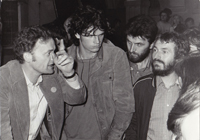
Friedrich Schorlemmer (left) during a peace conference in October, 1987, in the Saxon town of Meissen. The peace conference, during which criticism of the state was openly expressed, played an important role in the Peaceful Revolution.
"Dare to trust, so that we may live."
This cloth patch features the motto of the Evangelical Church Conference held in East Germany in 1983.
country: German Democratic Republic / year:
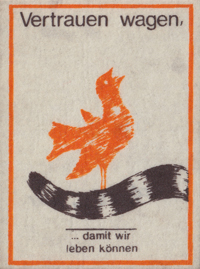
This cloth patch features the motto of the Evangelical Church Conference held in East Germany in 1983. The printing of cloth patches with symbols or slogans reveals the creative manner in which the restrictions on freedom of the press and expression were dealt with. Unlike with the printing of political motifs on paper, printing on cloth did not require any official permission. People stuck the cloth patches onto their clothing – but they could be reprimanded or even punished if they refused to remove them if told to.
A Pro-Democracy Demonstration
DE Friedrich Schorlemmer bei einer Demonstration in Wittenberge gegen die Stasiversuchung der Parlamente.
country: German Democratic Republic / year:
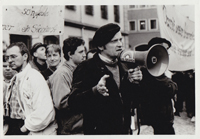
Friedrich Schorlemmer in Wittenberg at a demonstration against the parliament's infestation of Stasi agents.
Past – Present – Future
The motif of this postcard is a quotation of French scientist, writer and philosopher Blaise Pascal.
country: German Democratic Republic / year:
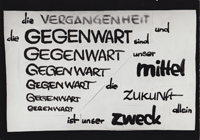
The motif of this postcard is a quotation of French scientist, writer and philosopher Blaise Pascal. "The past and the present are our means; the future alone is our end."
"Learn Peace"
This postcard reached a colleague of Friedrich Schorlemmer in 1982.
country: German Democratic Republic / year:
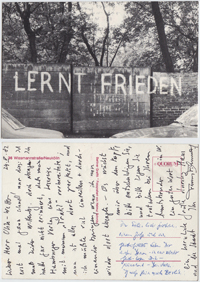
This postcard reached a colleague of Friedrich Schorlemmer in 1982. It came from Franz Fühmann, who had to cancel his appearance at the Church Conference due to health problems. The East German author and supporter of socialism, who had become increasingly critical of the path of development the GDR was taking, died two years later bitterly disappointed with the GDR.